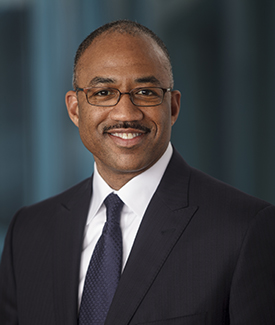Kermit R. Crawford, RPh
Honorary Doctor of Science
 If you’re just starting out in the workforce and see no way to reach the top, don’t give up hope. Stranger things have happened. Just ask Kermit R. Crawford, who began at Walgreens as a pharmacy intern and 31 years later retired as president, pharmacy, health, and wellness, of the nation’s leading drugstore chain.
If you’re just starting out in the workforce and see no way to reach the top, don’t give up hope. Stranger things have happened. Just ask Kermit R. Crawford, who began at Walgreens as a pharmacy intern and 31 years later retired as president, pharmacy, health, and wellness, of the nation’s leading drugstore chain.
“My goal is to support and show others the way to achieve dreams and goals in their lives that they never imagined having the ability to achieve,” says Crawford, a personable guy who is “honored and humbled” to be part of UMB’s platform party on May 15 at Royal Farms Arena.
As chief pharmacist at Walgreens, Crawford implemented a transformation in the community pharmacy setting. His efforts changed community pharmacy from a transaction-based practice, focused on the dispensing of medications, to one focused on access to affordable, quality care provided by pharmacists and other health care professionals. “Pharmacists are the ‘front door’ to health care in many of our communities,” Crawford says.
Now more than 75 percent of Walgreens stores are located in either rural or underserved communities. Every year since 2013 Walgreens has provided the second highest number of flu vaccinations around the country, second to only the federal government. The company has established several Centers of Excellence around the country that focus on increasing patients’ adherence to their medications and positive health outcomes for the treatment of HIV/AIDS, diabetes, childhood asthma, and other chronic diseases. And it established a partnership with the Centers for Disease Control and Prevention to provide free, rapid HIV testing under a two-year pilot program to make diagnosing the AIDS virus more convenient and accessible to Americans.
“It's been rewarding to witness and be a part of the tremendous change in our industry,” says Crawford, who retired as executive vice president and president, pharmacy, health, and wellness, in December 2014 and now serves as senior counselor to Walgreens.
“Many people don't realize pharmacists are trained to be health care experts, not just purveyors of prescriptions a doctor has written. They are the experts in medication and medication management. Nine out of 10 times, the pharmacist has a more holistic view of how patients manage their health care needs, adherence to medication regimens, if they have multiple physicians or are financially able to afford prescribed medications. Many don't understand the pharmacists’ real value in the health care system.”
University of Maryland School of Pharmacy Dean Natalie D. Eddington, PhD, FAAPS, FCP, is a big fan of Crawford, who was named Chain Drug Review’s 2009 Pharmacy Executive of the Year.
“Mr. Crawford is an example of a strong advocate for what community pharmacy should be,” Eddington says in her letter nominating him for a UMB honorary degree. “He lives the ideals of advocacy and interprofessionalism that the University of Maryland School of Pharmacy espouses to our faculty and students. Despite his many accomplishments, he has a strong vision for the future of community pharmacy, a vision shared by the School of Pharmacy.”
Crawford’s impact on U.S. retailing and health care hasn’t gone unnoticed outside the industry. In 2012, Savoy magazinenamed him one of the “Top 100 Most Influential Blacks in Corporate America.” Black Enterprise magazine called him one of the “Top 100 Most Powerful Executives in Corporate America.”
Deflecting the praise, Crawford credits others, saying “I had great support throughout my career.” In particular, he credits Ed Williams, his first district manager at Walgreens. Crawford says he hopes UMB’s Class of 2015 is as lucky as he was in finding a mentor like Williams.
“If you’re lucky during your career you'll meet at least one person who will take you under their wing and show you the way,” Crawford says. “For me, that person was Ed Williams — leader for me when I was young. I once called him my mentor and tormentor. He taught me the business, led with the right mix of accountability and support and taught me a lot about people. How you treat people is important. Treat people with respect. Treat people the way you want to be treated.
“I believe the success of others leads to your success. That people don't care how much you know until they know how much you care. And that if you’re passionate about the work you do, you'll never work a day in your life.”


